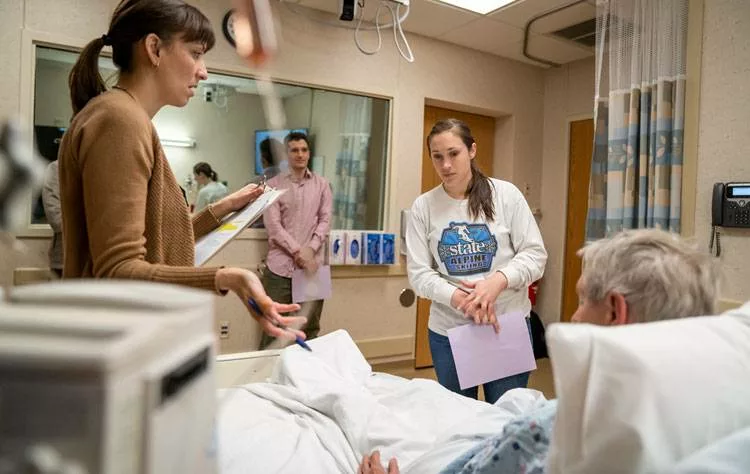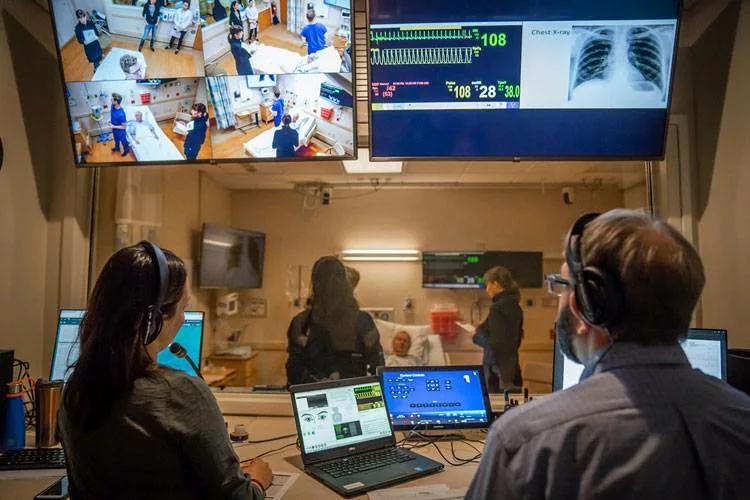Reflecting on a Career in Rural Medicine
Byron Crouse, founding director of the Wisconsin Academy for Rural Medicine, may have recently retired but his tireless efforts to improve rural health in Wisconsin will leave a lasting impact.
Emotions run high for graduating medical students, who will face big changes as they enter residencies,” says Sara Johnson, MD ’07, assistant professor, Department of Medicine, University of Wisconsin School of Medicine and Public Health.
With this in mind, the school’s innovative Internship Preparation Course provides practical know-how and interpersonal communication skills essential for students to assume responsibility for patient care in their internships. Formerly an elective in three departments, the enhanced course is required for all graduating medical students.
“This training focuses on consolidating knowledge and skills — which students have gained throughout their medical education — in a way that lets them draw upon these things while under pressure as new interns. One activity includes mock paging sessions in which students respond to nursing calls and receive feedback,” notes Will Aughenbaugh, MD ’97 (PG ’01), professor and vice chair for education, Department of Dermatology, and director, ForWard Curriculum’s Phase 3.
In spring 2017, Aughenbaugh coordinated establishment of the required course. It is co-directed in Madison by Johnson, Jamie Hess, MD, associate professor, Department of Emergency Medicine, and Amy Liepert, MD, assistant professor, Department of Surgery; in La Crosse by Kyla Lee, MD ’98, FACP, and Kimberly Lansing, MD, PhD, clinical adjunct associate and assistant professors, respectively; in Marshfield by Lori Remeika, MD, clinical adjunct professor; and at Milwaukee’s Aurora Health Care by Jessica O’Brien, MD (PG ’16). Leaders depend on faculty and staff in many primary care and specialty departments to develop and teach intensive, small-group sessions that constitute a large part of this course.

According to Christine Seibert, MD, associate dean for medical student education and services, “We have incorporated teambased activities and a lot of hands-on skills training in the simulation center, such as how to do intubations and ultrasounds.”
Liepert’s research related to the internship preparation curriculum focuses on student anxiety and confidence surrounding technical skills and clinical decision-making scenarios. Having adapted a national curriculum to prepare students for general surgery internships, she ensures that students are prepared to perform basic essential skills. For instance, the curriculum includes hands-on simulation activities related to IV placement, sterile technique, suturing and laparoscopy, as well as perioperative clinical decision-making.
Sections of the two-week Internship Preparation Course are taught by residents from several departments, who ramp up their teaching abilities to feel confident in lectures and simulation settings. For instance, internal medicine residents learn teaching skills through a Resident as Educator curriculum launched in 2015 by Johnson and Jessica Tischendorf, MD ’13 (PG ’16), former chief resident who is an honorary/associate fellow, Section of Infectious Diseases, and fellow, William S. Middleton Memorial Veterans Hospital. Residents choosing this opportunity engage in graduated teaching responsibilities and hone their instructional skills. The Internship Preparation Course has become so popular as a venue for resident teaching that now residents from multiple departments teach in the course.

The course keeps getting better. In 2018, leaders added a novel experience in which medical, nursing and pharmacy students participated in a clinical simulation focused on interprofessional communication and teamwork. Working with high-fidelity mannequins and standardized patients, interprofessional groups received targeted training and real-time feedback about their teamwork and communication from the standardized patients and faculty facilitators.
A student shared, “Having a standardized patient play an anxious family member in the room was a good addition to the case because it added complexity and problem solving that was required by the team.”
Hess notes, “This simulated interprofessional experience reinforces the critical role teamwork plays in internships to ensure safe, high-quality patient care.”
Associate Dean for Medical Education Shobhina Chheda, MD, MPH, concludes, “The ForWard Curriculum is full of new innovations, and the Internship Preparation Course — which requires intensive dedication among our faculty, staff and residents — is the perfect capstone experience, launching our students successfully into internships throughout the nation.”